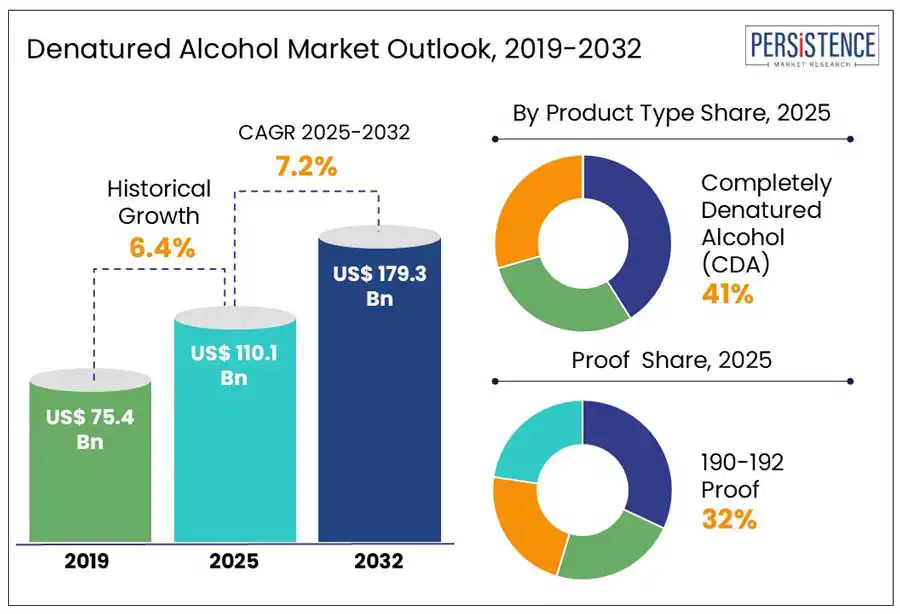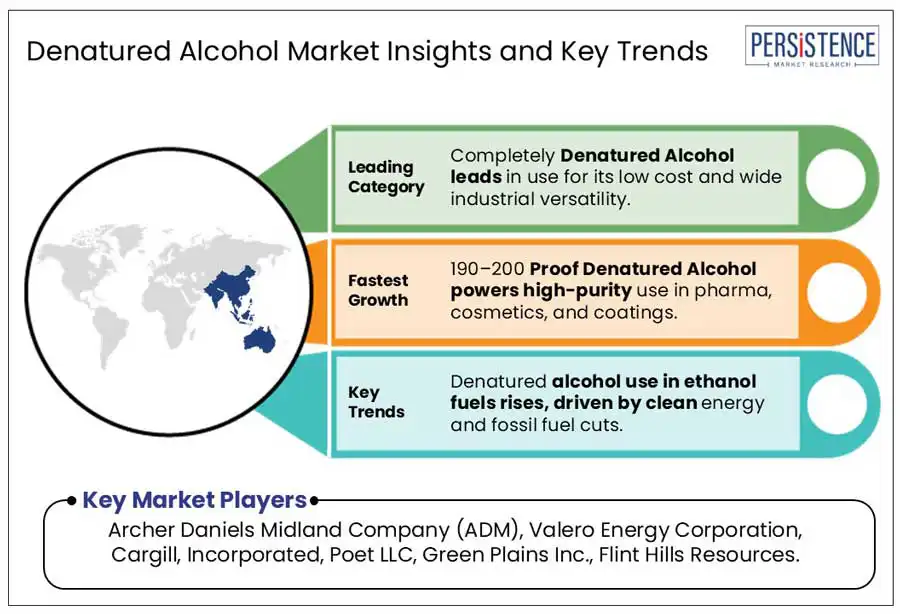ID: PMRREP35291| 170 Pages | 8 May 2025 | Format: PDF, Excel, PPT* | Chemicals and Materials

The global denatured alcohol market size is expected to increase from US$ 110.1 Bn in 2025 to US$ 179.3 Bn by 2032 at a CAGR of 7.2% by 2032. According to the Persistence Market Research Report, the rising demand for industrial cleaning agents and fuel additives drives the need for denatured alcohol in manufacturing industries. Innovation in bio-based denaturants and alcohol blends is expanding application versatility, particularly in paints and pharmaceuticals. Additionally, increasing focus on eco-friendly solvents and reduced VOC emissions supports sustainability goals across industries.

Key Industry Highlights:
|
Global Market Attribute |
Key Insights |
|
Denatured Alcohol Market Size (2025E) |
US$ 110.1 Bn |
|
Market Value Forecast (2032F) |
US$ 179.3 Bn |
|
Projected Growth (CAGR 2025 to 2032) |
7.2% |
|
Historical Market Growth (CAGR 2019 to 2024) |
6.4% |
The global denatured alcohol market is largely driven by its widespread use in industrial cleaning due to its excellent solvent properties. It effectively removes oils, greases, and contaminants, with a fast evaporation rate that enhances drying efficiency across automotive, pharmaceutical, and electronics sectors. The rising demand for high-purity, cost-effective cleaning agents, especially post-pandemic, has significantly boosted their adoption. Regulatory shifts toward eco-friendly solvents, supported by agencies like the U.S. EPA, underscore denatured alcohol’s biodegradability and alignment with sustainability goals. As a result, the industrial cleaning segment remains a key growth engine for the industry.
Industries seeking greener, low-residue solvents increasingly favor denatured alcohol over traditional petroleum-based alternatives. This transition followed by a consistent demand from maintenance, facility management, and surface treatment operations, reinforces its indispensable role in industrial hygiene protocols worldwide. In February 2024, Valero Energy Corporation expanded its ethanol production capacity in Texas to cater to rise in industrial demand, especially for high-purity denatured alcohol in cleaning applications.
The denatured alcohol market faces challenges from stringent environmental regulations and growing sustainability demands. Traditional denaturants like methanol are scrutinized for ecological harm, prompting agencies such as the ECHA and EPA to enforce strict usage guidelines. Manufacturers must invest in eco-friendly alternatives, increasing costs and production complexity. Adapting to diverse global standards and reconfiguring processes to meet sustainability goals is resource-intensive, potentially slowing innovation and market expansion. Additionally, the need for safer handling, storage, and disposal practices adds pressure on producers and suppliers to upgrade infrastructure. Failure to proactive adaptation may lead companies to face compliance issues, reputational setbacks, and a decline in their competitive position within the global marketplace. In the United States, the Environmental Protection Agency (EPA) classifies methanol as a hazardous air pollutant under the Clean Air Act, imposing strict regulations on its use and emissions in industrial applications.
The industry is witnessing a strong shift toward bio-based variants, fueled by rising environmental concerns and stricter sustainability regulations. Derived from renewable feedstocks such as corn and sugarcane, bio-based denatured alcohol provides a cleaner, lower-emission alternative to petrochemical-based solvents. Manufacturers are increasingly focused on improving bio-based production efficiency to meet the growing industrial demand while maintaining cost-effectiveness. This transition is gaining traction across industries such as pharmaceuticals, cosmetics, and automotive, where regulatory compliance and eco-conscious branding are critical.
Consumer demand for green, biodegradable products is pushing companies to innovate with sustainable formulations, giving them a competitive edge. As a result, bio-based denatured alcohol is expected to play a pivotal role in future market expansion. In 2024, Lallemand Biofuels & Distilled Spirits partnered with Braskem to develop renewable chemicals, highlighting the industry's commitment to sustainable solutions.
Completely Denatured Alcohol (CDA) stands out as a key segment in the denatured alcohol market due to its widespread application in industrial cleaning, sanitization, and solvent-based solutions. CDA's use in household products, such as disinfectants, is rising, especially in the wake of increased hygiene awareness post-pandemic. Its affordability and effectiveness make it a preferred choice in various sectors, ensuring it continues to capture a substantial market share. The significant demand for CDA in cleaning and solvent applications underscores its importance as a major contributor to market growth. In 2023, leading manufacturers such as Poet increased their bio-based denatured alcohol production capacity by 25%, focusing on renewable resources such as corn and sugarcane.
The 190-200 proof segment holds a significant role in the denatured alcohol market due to its high purity, making it ideal for specialized applications across industries like pharmaceuticals, paints, and coatings. This segment is gaining attention for its essential role in providing a cleaner, more potent alcohol that meets the stringent requirements for manufacturing products requiring precision. The market for 190-200 proof denatured alcohol is expected to expand as the demand for high-quality industrial solutions increases, particularly in sectors that rely on purity standards. In 2024, Greenfield Global introduced a 190 proof specially denatured alcohol (SDA 38B-38) blended with benzaldehyde, specifically designed for use in personal care products such as lotions, perfumes, and antiseptic solutions.

North America stands as a mature and innovation-driven market for denatured alcohol, holding a substantial global share, particularly in high-value applications across pharmaceuticals, personal care, industrial sanitization, and fuel blending. The region benefits from abundant bioethanol production, especially in the United States, where corn-based ethanol is readily available and widely used for both Completely Denatured Alcohol (CDA) and Specially Denatured Alcohol (SDA) formulations. The market is further supported by strong hygiene regulations, advanced healthcare infrastructure, and a well-established manufacturing base, particularly for 190–200 proof grades used in electronics, laboratory solvents, and medical disinfection.
The U.S. dominates North America’s market, driven by its large-scale chemical processing and regulated use of denatured alcohol in consumer goods, cosmetics, and industrial solvents. Canada also contributes steadily, with notable uptake in eco-friendly industrial cleaners and paint thinners, driven by sustainability mandates and growing demand from construction and printing sectors. Additionally, the regional policy push for greener fuel alternatives aligns well with denatured alcohol in ethanol-based energy applications. In September 2021, Molson Coors Beverage Company launched its first full-strength spirit, Five Trail Blended American Whiskey, under the Coors Whiskey Co. brand, marking its entry into the spirits market.
Asia Pacific is the fastest-growing market for denatured alcohol, with countries such as China, India, and Japan leading the demand. China holds the largest share in the region due to its significant chemical manufacturing base and strong usage in industrial and fuel blending sectors. India, with its expanding pharmaceutical sector and ongoing government support for ethanol blending through programs like the Ethanol Blended Petrol (EBP) initiative, is witnessing accelerated consumption. Meanwhile, Japan contributes stable demand through its high-quality standards in personal care, healthcare, and electronic cleaning applications.
The region’s growth trajectory is further bolstered by rising public health concerns, increased adoption of bio-based cleaning agents, and demand across the manufacturing and automotive sectors. Specially Denatured Alcohol (SDA) and 170–180 proof grades are gaining prominence due to their compatibility with local formulations and industrial needs. In November 2024, India Glycols Ltd partnered with Amrut Distilleries to distribute premium spirits in North India and announced plans to demerge and list its spirits business separately.
Europe holds a dominant position in the global denatured alcohol market, accounting for nearly 30% of the global revenue share, primarily driven by stringent environmental regulations and a high demand for industrial-grade solvents in cleaning, pharmaceutical, and coating applications. The European Union's policies on sustainable chemical usage and low-VOC solvent formulations have accelerated the adoption of denatured alcohol in manufacturing and industrial maintenance. Completely Denatured Alcohol (CDA) and 190–192 proof grades are widely utilized due to their versatility and regulatory compliance. The region’s maturity is reflected in stable demand across established industries and innovation in bio-based denaturants.
Germany leads the European market, backed by its large-scale chemical manufacturing base and advanced industrial cleaning sector. France and the UK follow closely, with demand concentrated in pharmaceutical and personal care product formulation. Stringent REACH compliance regulations further ensures steady demand for denatured alcohol as an alternative to more hazardous solvents. In August 2023, Univar Solutions was acquired by Apollo Global Management, enhancing its distribution capabilities across Europe and other regions.
The global denatured alcohol market is evolving through strategic moves like capacity expansions, backward integration, and partnerships with end-use formulators. Manufacturers are aligning with green chemistry standards and offering specialized blends for sectors like pharmaceuticals and electronics, intensifying competition and innovation. Growth opportunities are rising in emerging markets, particularly in Asia and Latin America, driven by fuel blending mandates and industrial demand. Distributors are enhancing supply chains through regional warehousing and compliance-focused logistics. As supplier alliances deepen, competitive advantage hinges on agility, scalability, and the ability to deliver high-purity, regulatory-compliant products across diverse global markets.
The market is set to reach US$ 110.1 Bn in 2025.
The denatured alcohol market is driven by rising industrial demand, bioethanol growth, pharmaceutical needs, sustainability trends, and its use in personal care products.
The industry is estimated to rise at a CAGR of 7.2% from 2025 to 2032.
Key opportunities in the denatured alcohol market include growth in renewable energy, sanitization products, eco-friendly solvents, and high-purity ethanol innovations.
The major players dominating the global denatured alcohol market are Archer Daniels Midland Company (ADM), Valero Energy Corporation, Cargill, Incorporated, Poet LLC, Green Plains Inc., and Flint Hills Resources.
|
Report Attribute |
Details |
|
Historical Data/Actuals |
2019 - 2024 |
|
Forecast Period |
2025 - 2032 |
|
Market Analysis Units |
Value: US$ Bn/Mn, Volume: As applicable |
|
Geographical Coverage |
|
|
Segmental Coverage |
|
|
Competitive Analysis |
|
|
Report Highlights |
|
|
Customization and Pricing |
Available upon request |
By Product Type
By Application
By Proof
By Region
Delivery Timelines
For more information on this report and its delivery timelines please get in touch with our sales team.
About Author